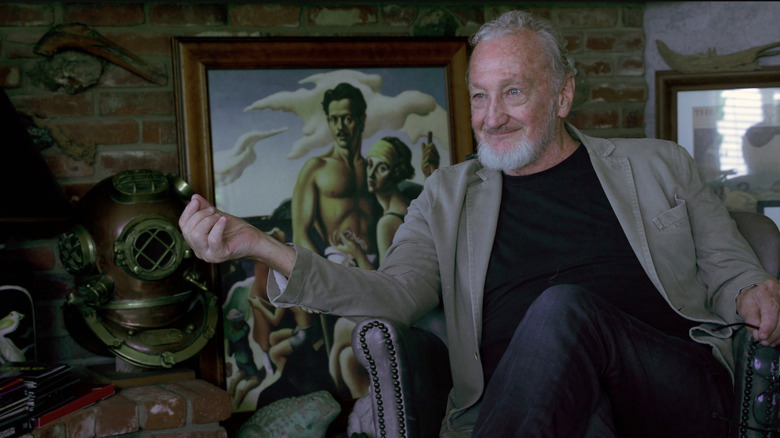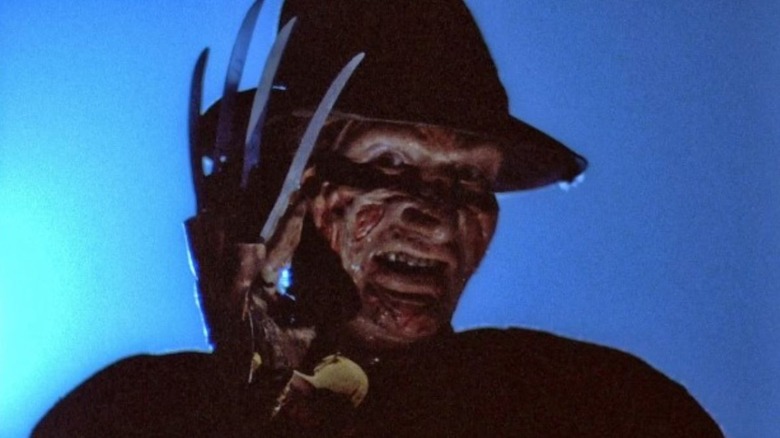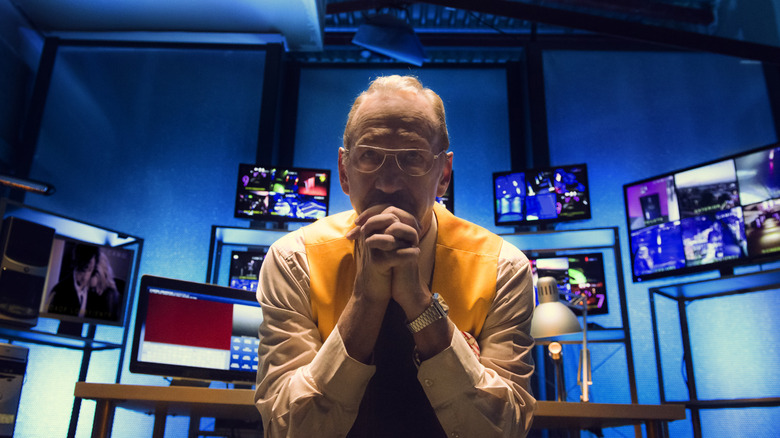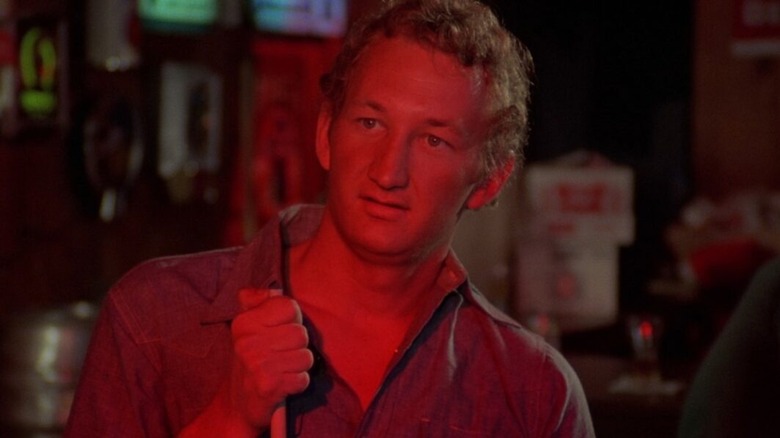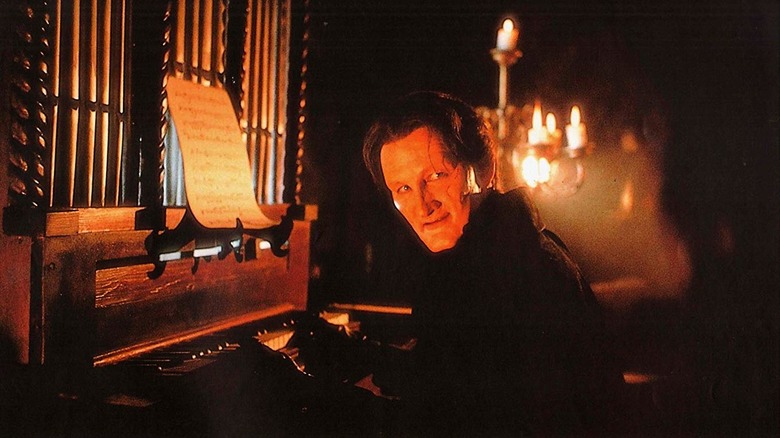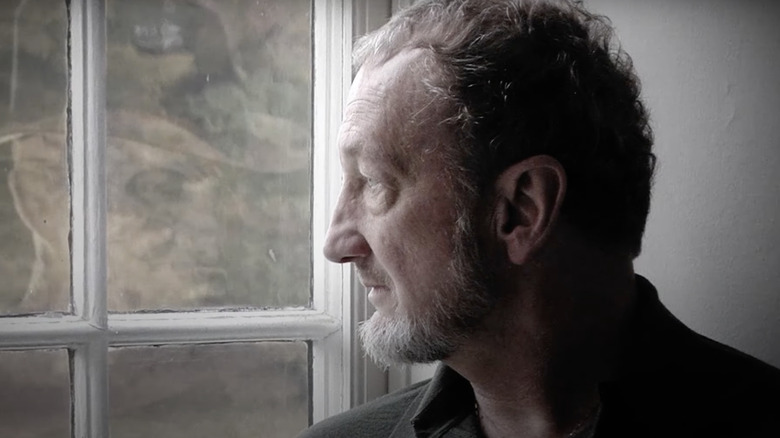Robert Englund Shares The Secrets Of Becoming A Horror Icon [Exclusive Interview]
Even if you only have a passing interest in horror films, chances are you've been terrified by Robert Englund. The man who brought Freddy Krueger to life in the "A Nightmare on Elm Street" franchise is a living legend, and fans are soon going to be able to peek behind the striped sweater and razor gloves in the new documentary, "Hollywood Dreams & Nightmares: The Robert Englund Story." Directed by Gary Smart and Chris Griffiths, who recently won the morbid statue for Best Documentary for "Pennywise: The Story of It" at Fangoria's Chainsaw Awards, the documentary follows the life and career of one of horror's most recognizable and prolific performers.
Ahead of the film's release on the Screambox streaming platform and VOD, I was honored to speak with Englund about the staying power of Freddy Krueger and how one becomes a horror icon. I wore a yellow button-up with black crosses on it, a replica of Jesse Walsh's signature look in "A Nightmare on Elm Street 2: Freddy's Revenge" (and subsequently Bill Hader's Richie in "It: Chapter 2"), which Englund clocked immediately. "Give Mark Patton his shirt back," he joked at the end of our interview.
Talking to Robert Englund is a bit surreal, considering he was the source of many sleepless nights as a child. It's a reputation Englund is acutely aware he has, effortlessly snapping into the Freddy persona when it's time to ham it up in front of a crowd before pivoting into the warm, thoughtful, articulate man he is off-screen. They say "never meet your heroes," but after talking with Englund, I wholeheartedly encourage everyone to face their fears and meet their monsters.
Note: This interview has been edited for clarity and brevity.
One, two, Freddy's coming for you...
I think something that draws me to horror is that fear is a universal emotion, but what causes that fear is different from person to person. What do you think it is about Freddy Krueger that has managed to terrify people from multiple generations and all walks of life?
Englund: Well, I think it's the basic hook of the franchise, which is that he can invade your most private space: your mind. He invades your mind and its subconscious when you're in that realm of dreaming, of the nightmare, of the lowered REMs of sleep. That's a very private place. It's like if somebody looks in your diary or in that drawer by your bedside [and sees] your private thoughts and possessions. He can exploit that.
So, he knows what your private, if not your public fears are. He knows the boy you have a crush on, or the girl you have a crush on, or whatever you fear, whether it's drowning, or bugs, or whatever that is, and he can exploit that. I think that's such a personal, private guarded space. The idea is that if you hear the story of Freddy, the legend of Freddy, the myth of him in the locker room or at a sleepover somewhere ... once you've heard that, when you fall asleep, the fact of that knowledge can now infect your subconscious. I think that's just a really scary concept.
The role he wishes we talked more about
Freddy is your most iconic role, but you are inarguably one of the genre's most prolific performers. What is a role that you've done that you wish more horror fans would talk about?
Englund: Well, I think because of the internet and streamers, people have caught up on a lot of them. I think Tobe Hooper did a real interesting job on "Stephen King's The Mangler." I think that's kind of rising now in all of the adaptations of Stephen King. Maybe it's better than some of the earlier ones that were done. So, I would say that.
I have a recent film that has an unfortunate title directed by a really talented young director out of London named Phil Hawkins, and it's called "The Last Showing." The "last showing" is the English way of saying "midnight movie," or the last movie being screened that day. In America, it sounds more like something to do with the fashion world. Showing, we don't say that. Even though they know that phrase in the UK and I think Australia, we don't use it, so I would've loved to have called it "Midnight Movie" or something, but it's a terrific little film.
It reminds me of a really high-gloss, low-budget, 1970s Brian De Palma film. It's very smart. I'm good in the film, but it's an incredibly raw, and risky, and compelling performance by Finn Jones from "Game of Thrones." Finn's just remarkable in this film. He's really the spine of the film, and I wish more people would've seen it. It's a good little film. It's not calling a lot of attention to itself, but it's a small perfect little film for the fans, and there's a lot of little, I don't want to say Easter eggs in it, but it's sort of deconstructs the love of horror and what's going on a little bit, too. It's fun. You could even see it as traditional. I just love it, and I love the bit of the retro aspect of it being a little bit De Palma.
A little love for William Finley
Oh, fantastic. De Palma's one of my all-time favorites.
Englund: Well, "Sisters" [is in] my top 10. [...] I'm a huge fan of that actor, William Finley. I think his performance in "Sisters" is probably the best mad doctor in the history of cinema.
He's brilliant. I have a "Phantom of the Paradise" poster behind me.
Englund: Yes! Another one. I also worked with Bill [Finley] in "Eaten Alive" for Tobe Hooper, and he's also in "The Fury." Someone told me he was De Palma's roommate in college.
Oh, interesting. I didn't know that.
Englund: Apparently, he would not leave New York. He was one of those people like Whoopi Goldberg and Sam Shepherd that doesn't like to fly, so he was kind of a homebody. That may have hurt his career a bit.
But if it's comfort, who are we to complain?
Englund: Boy, I get it now. Every time I go to the airport now, I think I get the shingles. [laughs]
What makes a horror icon?
So, I loved towards the end of the documentary where there's the discussion about the horror genre greats: Boris Karloff, Lon Chaney, Christopher Lee, Vincent Price, etc. As somebody who I feel falls very much in that category, do you think there is a common thread between you all as artists that has allowed you to thrive in that genre space?
Englund: Well, I was a huge horror fan as a child. It's not that I outgrew it, I just became other things. I became a classically trained theater actor and I was a little bit full of myself for a while and I kind of pushed that in the back of my mind, but I think with me, I think it's kind of just the luck of aging. Freddy was only my second horror film [in] "The Nightmare on Elm Street." I played a cowboy in my first one, "Eaten Alive," for Tobe Hooper. When I finally got out of the makeup after "Wes Craven's New Nightmare," I had aged. It had been 10, 11 years, and I was in my 40s and my hairline was receding, and my cheeks hollowed out a little bit, and I had one or two scars on my face and I started to look more like I could move into the sort of Vincent Price roles a bit.
Hard work and good luck
Totally.
Englund: Nobody else was making that segue into that world, and I was offered, especially in Europe, a lot of roles where I could play the aging prince, or I could play the old projectionist, or I could play these roles using my own face, but it worked in the world of horror, and thrillers, and science-fiction. As well as that, I think I brought the baggage from being a genre star from "Nightmare on Elm Street" and "Phantom of the Opera," "Stephen King's The Mangler," and others because I brought that momentum with me. I think it served me well and it was this happy accident because had I not done horror films, I don't know if I would be working still because I had been typed as a best friend, a BFF, a sidekick, a pal, the buddy ... [and] those generally were aging out for my generation.
If I'd been around in the '30s or '40s or '50s, I would've kept working as a best friend and a sidekick because those roles were traditionally played by older guys. Jimmy Stewart had an older guy that he hung out with, and John Wayne had an older guy, an old fart that he hung out with. I could have done that, but that kind of went away in the '70s. So, it's kind of a happy accident that I fell into horror and that when I finally took off all the foam latex, I had a face that could play the scientist, or the old professor, or the priest that knows the secret of the exorcism and things like that, which is what I'm doing now.
"Hollywood Dreams & Nightmares: The Robert Englund Story" will be available on Screambox and Digital beginning June 6, 2023.
